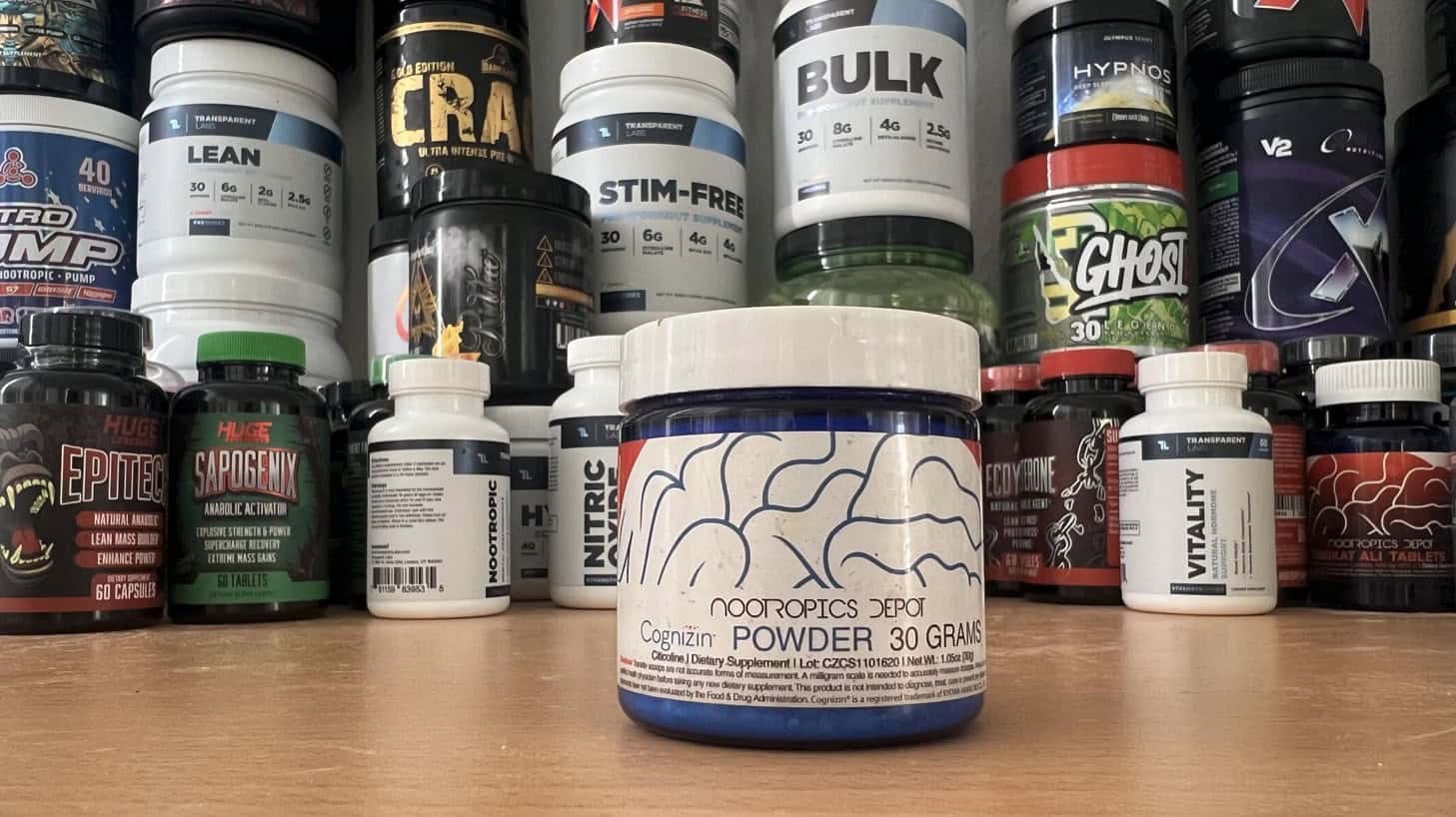
When it comes to brain health, two nootropics are often brought up: Citicoline and Cognizin.
Both are known for their potential to enhance cognitive function, but what exactly are they, and how do they differ?
In this article, we'll delve into these two brain-boosting compounds' origins, benefits, and how they stack up against each other.
Citicoline and Cognizin are both forms of the same compound used to support brain health.
Citicoline is a generic form of the compound, while Cognizin is a patented form that has undergone specific clinical trials.
Both have been shown to support cognitive function, but they may have different effects based on the individual and the specific formulation of the supplement.
Citicoline, chemically known as cytidine-5'-diphosphocholine (CDP-choline), is a compound that naturally occurs in our bodies.
It's identical to a natural compound in our cells that helps to build a key component of our cell 'wrappers'.
After ingesting or injecting citicoline, it's believed to be quickly broken down into two parts, cytidine, and choline, which enters the brain separately and rebuild CDP-choline inside brain cells.
Citicoline has been shown to have protective activity in preclinical brain injury and trauma models.
However, two recent, large, pivotal clinical trials have revealed no benefits in ischemic stroke and traumatic brain injury.
Nonetheless, the substance seems beneficial in some slowly advancing brain disorders such as glaucoma and mild vascular cognitive impairment.
In one study, researchers found that citicoline could protect against hair cell loss caused by a drug called neomycin by inhibiting the build-up of harmful reactive substances and thus preventing cell death.
This suggests that citicoline might be a potential therapeutic drug to protect hair cells in the clinic.
Another study found that citicoline could significantly reduce the harmful effects of neomycin on mitochondria (the 'powerhouses' of cells) and inhibit the build-up of harmful reactive substances and subsequent cell death.
In a study, researchers found that citicoline could protect against the loss of nerve cells in glaucoma by controlling factors independent of eye pressure.
This suggests that citicoline might serve as a potential therapeutic drug in the clinic to protect nerve tissues and visual function in glaucoma beyond controlling eye pressure.

Cognizin, or CDP-Choline, is a compound naturally occurring in our bodies. It plays a key role in keeping our brains healthy.
Think of it as a fuel source for one of the brain's key messengers, a neurotransmitter called acetylcholine.
This messenger involves many brain functions, including memory and muscle control.
Cognizin is known for its potential to enhance brain function, improve memory, and keep the brain's cell 'wrappers' (neuronal membranes) in good shape.
It's often used as a dietary supplement to boost brain performance and is found in several brain-boosting supplement mixes, known as nootropics.
Recommended reading: Best Nootropic Pre-Workouts
The benefits of Cognizin come from its ability to increase levels of several important brain messengers, improve blood flow to the brain, and enhance energy production in brain cells.
It's also believed to promote the creation of new brain cells, maintain the health of brain cell 'wrappers', and reduce the harmful effects of oxidative stress in the brain (think of this as 'rusting' in the brain).
Research has shown that Cognizin can be beneficial in treating cognitive impairments, such as those seen in age-related cognitive decline, Alzheimer's disease, and stroke.
It has also been found to improve attention and reduce impulsive behavior in adolescents with ADHD.
In one study, researchers found that Cognizin supplementation improved attention and mental processing speed in healthy adolescent males.
Another study showed that Cognizin supplementation could enhance the energy supply in the brain's frontal lobe and cognition in female adolescents.
Citicoline, or Cognizin, is a substance our bodies produce naturally.
It plays a crucial role in brain function and health. Here's a simplified explanation of how it works and its potential benefits:
Citicoline is a key player in the production of phosphatidylcholine, a major component of our cell membranes.
In simpler terms, it helps create the protective layer surrounding our cells, keeping them safe and functioning properly.
When it comes to our brain, Citicoline boosts the levels of certain chemical messengers, such as acetylcholine and dopamine.
These messengers are involved in learning, memory, and other cognitive processes.
By increasing their levels, Citicoline supports our brain's thinking, learning, and remembering ability.
Benefits Of Citicoline
Remember, while Citicoline has many potential benefits, it's always important to consult a healthcare provider before starting any new supplement regimen.
While Citicoline and Cognizin are fundamentally the same compounds, the main difference lies in their form.
Cognizin is a patented form of Citicoline designed to offer superior absorption and efficacy.
Determining which one is better depends largely on individual needs and preferences.
Citicoline and Cognizin offer potential cognitive benefits, but Cognizin may offer superior absorption due to its patented form.

Citicoline is a naturally occurring compound that plays a crucial role in brain health.
It synthesizes phosphatidylcholine, a major component of the brain's grey matter.
Citicoline has been extensively studied and is known to have several benefits:
Cognizin is a patented, highly bioavailable form of citicoline that has been clinically tested in humans.
It supports mental energy, focus, attention, and recall.
Here's what makes Cognizin stand out:
While both Citicoline and Cognizin play a role in brain health, there are key differences between them:
In conclusion, Citicoline and Cognizin can support brain health but differ in formulation, bioavailability, clinical testing, and quality assurance.
It's important to consult with a healthcare professional before starting any new supplement regimen.
Here is how much both should be dosed at...
Citicoline is typically administered orally, ranging from 250 to 2,000 mg daily.
These dosages have been evaluated in adolescents and adults in clinical trials.
Lower doses, such as 100 mg twice daily, have been used in short-term trials (6 weeks) with combination therapy in patients with major depressive disorder.
Cognizin, a patented, branded form of Citicoline, has been studied in participants ingesting more than the recommended dosage of 250-500 mg per day.
It's important to note that the exact dosage may vary based on individual needs and it's always recommended to follow the advice of a healthcare professional.
Citicoline and Cognizin are generally well-tolerated, but potential side effects may include digestive upset, headache, and insomnia.
Always consult with a healthcare provider before starting any new supplement regimen.
Alpha GPC is another popular nootropic supplement known for its potential cognitive benefits. Like Citicoline, it plays a role in the synthesis of phosphatidylcholine. However, the two differ in their bioavailability and potential cognitive benefits.
Recommended: Alpha GPC vs Citicoline: Which is Better?
Choline Bitartrate is a form of choline, a nutrient essential for brain health.
While it shares some similarities with Citicoline, its bioavailability and potential cognitive benefits differ.
CDP Choline is simply another name for Citicoline.
They are the same compound and offer the same potential benefits.
Individuals looking to support their cognitive function, memory, and overall brain health may benefit from using Citicoline or Cognizin.
As always, it's important to consult with a healthcare provider before starting any new supplement regimen.
While Citicoline and Cognizin are generally safe for most people, those with a known allergy or sensitivity to choline compounds should avoid them.
Additionally, individuals with certain medical conditions or those taking specific medications should consult a healthcare provider before use.

What are the potential benefits of Citicoline and Cognizin?
Both Citicoline and Cognizin have been studied for their potential to support cognitive function, memory, and overall brain health.
Are there any side effects associated with Citicoline or Cognizin?
Potential side effects may include digestive upset, headache, and insomnia. Always consult with a healthcare provider before starting any new supplement regimen.
Can Citicoline or Cognizin interact with other supplements or medications?
While Citicoline and Cognizin are generally safe, they may interact with certain medications. It's always best to consult a healthcare provider before starting any new supplement regimen.
Citicoline and Cognizin are forms of the same compound, naturally found in every body cell, and is especially vital to brain health.
They both have been shown to support cognitive function, improve attention, and promote an increase in brain energy.
However, Cognizin is a specific patented form of Citicoline that has undergone specific clinical trials.
While both Citicoline and Cognizin are used to support brain health, they are not interchangeable.
They may have different effects based on the individual and the specific formulation of the supplement.
It's always recommended to consult with a healthcare professional before starting any new supplement regimen.
Useful Links
 About FitFrek
About FitFrekFitFrek operates as an independent platform, offering comprehensive workouts, programs, routines, guides, and unbiased reviews to accelerate your progress. We pride ourselves on our honesty, delivering straightforward and candid insights. FitFrek does not offer medical advice, diagnosis, or treatment services.